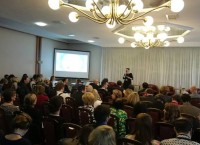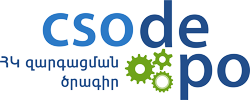
Գլխավոր Ասամբլեա Բուդապեշտում. ԵՄ-Ռուսաստան և համաշխարհային երկխոսության օրինակը (անգլերեն)
On 9 December 2015, the 6th General Assembly (GA) of the EU-Russia Civil Society Forum (CSF) ended its work in Budapest, Hungary. It gathered almost 200 representatives of member organisations, observers, donors, and the media.
‘The main topic of this General Assembly was discussing cross-cutting issues for the civil societies in the EU and Russia,’ says Anna Sevortian, Executive Director of the EU-Russia CSF. 'We touched on a variety of topics equally pertinent to both sides – observing international law obligations, migration, LGBTIQ rights, climate change, and much more. Civil societies has a lot to say on these issues and should be better heard by policy-makers in the EU, separate member states, and in Russia. However, the reality for the third sector actors in many places is quite different. One of the reasons to choose Hungary for GA this year was our wish to express solidarity with civil activists under pressure.’
Focusing on the situation in Hungary, the organisers gave the floor to prominent local activists - Lilla Hárdi, Psychotherapist of refugees at the Cordelia Foundation; Péter Krékó, Director at the Political Capital Institute; Veronika Móra, Director at the Ökotars Foundation; Márta Pardavi, Co-Chair at the Hungarian Helsinki Committee; Máte Szabó, Programme Director at the Hungarian Civil Liberties Union; Szilvia Suri, Co-Founder and President at the Roma Press Centre.
The General Assembly reconfirmed Forum’s commitment to openness and value-based dialogue – both among civil society actors and with authorities. The GA started with welcome speeches by István Íjgyártó, Minister of State for Cultural and Science Diplomacy at the Ministry of Foreign Affairs and Trade of Hungary; Vladimir Sergeev, Ambassador of the Russian Federation to Hungary; and Vygaudas Ušackas, Ambassador, Head of the Delegation of the European Union to the Russian Federation.
‘For me, the last day of the discussions had a special value – with parallel sessions on fighting trans-border corruption, social innovation, and Helsinki +40 process,’ shares Harry Hummel, Policy Director at the Netherlands Helsinki Committee, member of the Forum’s Steering Committee (SC) and moderator of the discussion on the Helsinki Final Act. ‘With the challenges we face in Europe and globally – war in Ukraine, large number of refugees, fear for ISIS, rise of authoritarian politics – it is utterly important to stand by universal human rights. We as international civil society have to swiftly adopt to new challenges and start working together on ways to implement our solutions.’
In this sense, Forum members and guests made their own contribution to the on-going campaigns of the civil society groups in the EU and Russia. They collected donations for the “Migration Aid” initiative from Hungary that saves lives and helps refugees in the country and Europe-wide. They signed postcards to Evgeni Vitishko, an imprisoned activist from the “Environmental Watch on North Caucasus”. Finally, the Working Group “Environment” published a statement on restriction of use of large-scale hydropower and nuclear power plants, which was brought by a member of the Working Group to the UN Climate Change Conference in Paris.
‘My personal highlight from the General Assembly was the Steering Committee election,’ tells Elena Belokurova, Board Member at the “German-Russian Exchange” (St. Petersburg, Russia), a newly elected SC member. ‘Last year, I was a candidate at the municipal election and failed – due to fraud and hurdles. At the General Assembly, I experienced a fair and transparent voting procedure, which was organised very well. I hope that this election would be a paragon for the elections in Russia and worldwide someday.’
Source can be found here.
